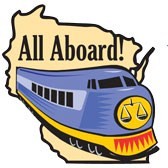 The Wisconsin Equal Justice Conference is an education forum for advocates on access to justice issues related to low-income and disadvantaged clients. More than 120 people attended this year’s biennial conference in Milwaukee on March 6, 2015. Sponsored by the State Bar of Wisconsin Legal Assistance Committee and Public Interest Law Section, as well as the Wisconsin Access to Justice Commission, the conference offered a variety of presentations on topics of interest to attorneys who do pro bono work or are employed in public service. Here is a short summary of the conference sessions. Conference materials are available online (login may be required).
The Wisconsin Equal Justice Conference is an education forum for advocates on access to justice issues related to low-income and disadvantaged clients. More than 120 people attended this year’s biennial conference in Milwaukee on March 6, 2015. Sponsored by the State Bar of Wisconsin Legal Assistance Committee and Public Interest Law Section, as well as the Wisconsin Access to Justice Commission, the conference offered a variety of presentations on topics of interest to attorneys who do pro bono work or are employed in public service. Here is a short summary of the conference sessions. Conference materials are available online (login may be required).
Marsha Mansfield, from the Wisconsin Access to Justice Commission and Nicole Yunk Todd from Wisconsin Community Services led a session on effective messaging to funders and policy makers. Mansfield shared the results of public opinion and messaging research developed by Voices for Civil Justice. Those research findings addressed the types of messaging most effective for reaching potential supporters and funders. The Public Welfare and Kresge Foundations prepared a Natural Allies brochure that sets forth the rationale for what should be a partnership between philanthropic goals and the aims of civil legal aid programs. The Access to Justice Commission has distilled that message into a shorter, Wisconsin-focused brochure that the Commission will be utilizing in its foundation outreach efforts.
Linda Albert, with the State Bar’s Wisconsin Lawyers Assistance Program, discussed how to recognize and avoid compassion fatigue — “the cumulative physical, emotional and psychological effects of being continually exposed to traumatic stories and events when working in a helping capacity.” See her article in this edition of Just Wisconsin.
Dean Dietrich, chair of the Professional Ethics Committee, and Tim Pierce, State Bar Ethics Counsel, reviewed the changes to Wisconsin’s ethics rules on limited scope representation and answered questions about the new rules. Limited scope representation provides a way to offer some help to clients who may not be able to obtain more complete full representation.
The business case for doing pro bono work for individual lawyers and law firms was the topic of Attorney Roy Ginburg’s presentation to attendees. Ginsburg along with a number of attorneys in large and small Wisconsin firms described how pro bono work fits into and enhances everyday law practice..
The keynote and technology session speaker was Lisa Colpoys, executive director of Illinois Legal Aid Online, a nationally recognized, statewide technology support center for legal services in Illinois. Colpoys described how embedding existing innovations and technology into legal aid work can provide a gateway to legal assistance and information for the poor.
